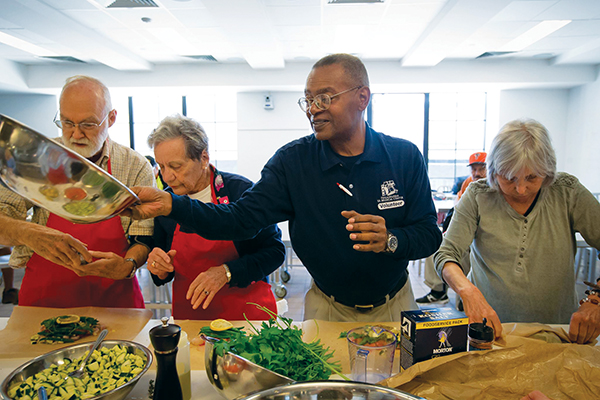Photo by Ryan Brandenberg
Beyond the Cookbook
by Alex Jones
Tucked away on the fourth floor of the Free Library’s Parkway Central branch, you won’t find the rare book collection. Instead, hidden behind an unassuming door you’ll discover a gleaming, commercial-grade culinary classroom. It’s a nontraditional space for a library, but library coordinator Suzanna Urminska believes that the Culinary Literacy Center (CLC) fits right in.
“Every bite of food has a story,” says Urminska. “Literacy can be taught through cooking, and cooking can be taught through literacy.” The CLC’s mission is to develop a slate of programming to build confidence, encourage curiosity in the kitchen, and empower Philadelphians of all backgrounds around health, literacy and food.
“In Philadelphia,” says Urminska, “there are people of all ages working to improve their literacy… There are also challenges around food access and how to make a doctor’s mandate of eating fruits and vegetables happen for yourself so that it’s culturally relevant, appetizing and fun. That’s the work we’ve been refining over the past two years.”
Activating the space and getting new patrons inside the library has been key. At night, top chefs and authors from around the city and country come out to teach classes and events on topics from ancient Roman cooking to whole-hog butchery to restaurant workers’ rights—which has the added benefit of engaging citizens who might not participate in other CLC programs.
“One thing we’ve learned about our evening classes, which are sort of a one-off way to highlight the extensive food culture that exists in Philadelphia, is that [many attendees] were not library users or did not have a library card,” says Urminska. “I see that as a win. Once people come in and are excited about the CLC, we’re able to share the other wonderful resources that are available [here] for the use of all Philadelphians.”
A dizzying array of people have been served by CLC programming including kids, adult ESL learners, refugees, blind patrons and military veterans. One curriculum, A Taste of Africa, creates a connection to cultural foodways and recipes of the African diaspora, with an emphasis on building better health and well-being for students overall.
Shivon Love, a nutrition educator and food justice advocate, was hired this year as the library’s first food literacy and access coordinator. “[The class] serves as a reminder of the rich relationship that people of African descent have always had with food,” says Love. “Anywhere that you find descendants of Africa, you will find inspiration for this curriculum. Dakar, Senegal; Bahia, Brazil; Low Country, South Carolina; or 52nd Street, West Philadelphia.”
Her approach means that the class may look at several variations on a theme that can be traced to African origins, with each culture of the diaspora creating its own version of a dish. Take jollof, a West African one-pot rice dish: Variations exist in different regions of that part of the continent, but American variations show up in examples such as jambalaya and Charleston red rice.
This year, the center is doubling down on its commitment to culinary literacy, thinking strategically about how to bring CLC programming to outlying branches while also sharpening its focus on programs to connect SNAP recipients with education and resources. They’ll pilot a 16-week
ESL class centered on food, culture and library skills with recipes prepared using a tabletop kitchen kit that allows any branch to host programming.
Empowering the communities served by each branch is an explicit goal of the program. “We want to create a model in which we support and develop a training program for folks who live in the communities of
the [branches] we would be working with to be nutrition educators,” says Love. “[And], in turn, they would teach their immediate community.” For Love, information really is power.
“If you look at the state of health in this country today, we know there’s a disparity between what is available in terms of healthy food [and] who gets healthy food,” she says. “Some of the disparity is access to information. Sometimes what prevents people from nourishing themselves is not knowing how to prepare healthy meals. I think that just a little bit of information can go a long way in terms of making sure that people are taking agency over their health. It’s not just an income issue—it’s a skill issue and an access issue.”







